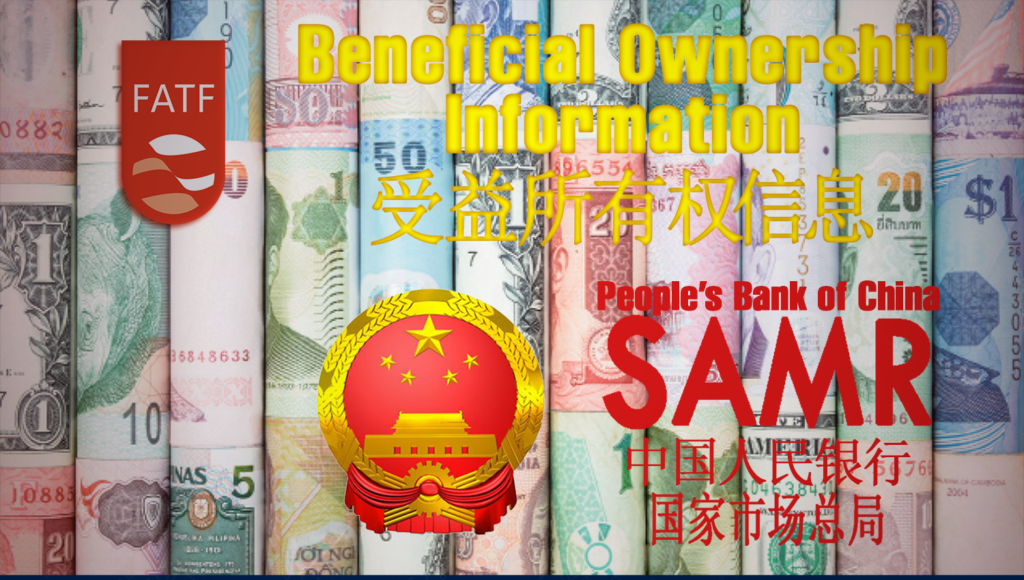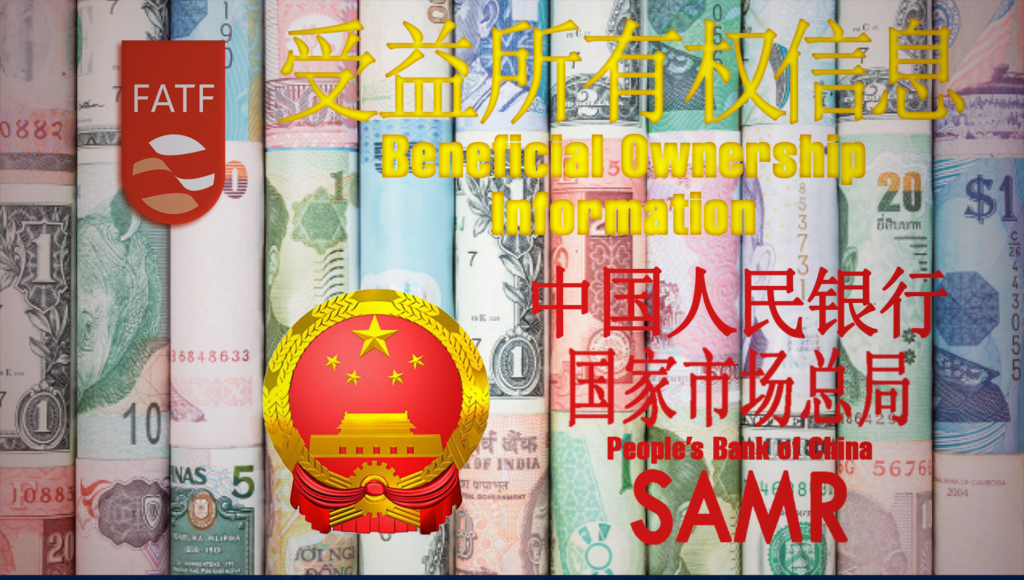As of November 1, 2024, China has officially enforced beneficial owner information (BOI) filing requirements for all business entities. This follows the implementation of the Administrative Measures on Beneficial Owner Information (受益所有人信息管理办法) , jointly issued by the People’s Bank of China (PBOC) and the State Administration for Market Regulation (SAMR) in April 2024.
Under the new regulations, businesses established before November 1, 2024, must achieve full compliance by November 1, 2025. This initiative aligns with China’s broader efforts to enhance corporate transparency, combat financial crimes, and strengthen regulatory oversight.
China’s implementation of the Beneficial Ownership Information (BOI) filing requirements marks a significant step toward enhancing corporate transparency, strengthening anti-money laundering (AML) measures, and aligning with global regulatory standards. The initiative aims to optimize the business environment, improve ownership transparency, and prevent financial crimes such as money laundering and terrorist financing.
This move builds on previous efforts by the People’s Bank of China (PBOC), particularly its 2018 Notice on Further Improving the Identification of Beneficial Owners, which mandated financial institutions and other AML-responsible entities to conduct due diligence on beneficial ownership.
While China’s BOI regulations share similarities with the U.S. Corporate Transparency Act (CTA) and the U.K.’s Economic Crime and Corporate Transparency Act, they also have distinct features that businesses must understand.
These new BOI filing requirements will impact a wide range of companies, but they are especially critical for foreign investors operating in China. Understanding the compliance obligations under the Measures is essential. Below, we outline the key requirements and the steps companies must take to ensure full compliance.
WHO MUST FILE THE Beneficial Ownership Information (BOI)?
The Administrative Measures on Beneficial Ownership Information require certain business entities in mainland China to submit Beneficial Ownership Information (BOI) filings. These entities, collectively known as “filing entities,” include:
- Companies, partnerships, and branches of foreign companies operating in China.
- Other designated entities specified by the State Administration for Market Regulation (SAMR) and the People’s Bank of China (PBOC).
- Organizations with complex ownership structures that fall under regulatory scrutiny.
However, the Measures provide an exemption for small businesses if they meet all of the following conditions:
- The business’s registered capital does not exceed RMB 10 million (or its equivalent in foreign currency).
- All shareholders or partners are natural persons, meaning there are no corporate shareholders or entities involved.
- There is no external individual exercising actual control over the business or benefiting from it through means other than direct ownership.
Even if an entity qualifies for this exemption, it must confirm its status through the designated government system. Failure to properly declare exemption status may result in regulatory penalties or additional oversight from authorities.
HOW DOES A COMPANY IDENTIFY ITS BENEFICIAL OWNER?
Under the Administrative Measures on Beneficial Owner Information (BOI), a beneficial owner is defined as an individual who ultimately owns, controls, or benefits from the interests of a filing entity. The Measures outline three primary criteria to determine beneficial ownership. Any individual meeting any one of the following conditions is considered a beneficial owner of the entity:
- Direct or Indirect Ownership: The individual owns 25% or more of the equity, shares, or partnership interests in the filing entity.
- Income or Voting Rights: Even if the individual does not meet the ownership threshold, they hold 25% or more of the income rights or voting rights in the entity.
- Actual Control: The individual, either alone or jointly with others, exerts significant control over the entity’s decision-making or financial management.
Understanding “Actual Control”
The third criterion, “actual control,” is broadly defined and includes influence exerted through contracts, relationships, or other mechanisms. Examples of actual control include:
- The power to appoint or dismiss key personnel, such as the legal representative, directors, supervisors, senior officers, or executive partners of the entity.
- The authority to approve major business, management, or financial decisions.
- Long-term control over significant assets or financial resources used by the entity.
If an entity is unable to identify a beneficial owner based on these three criteria, the Measures provide an alternative method. In such cases, the individual(s) responsible for the daily operations and management of the business will be deemed the beneficial owner(s) for reporting purposes.
Special Rules for Foreign Branch Offices
For branches of foreign companies, the determination of a beneficial owner follows the same three-prong criteria. However, the filing must be completed by a senior officer of the branch, even if the parent company is exempt from beneficial ownership reporting in its home country. China’s reporting requirements apply regardless of exemptions in foreign jurisdictions.
Multiple Beneficial Owners
While the Measures do not explicitly specify a limit on the number of beneficial owners per entity, the People’s Bank of China (PBOC) clarified in an official statement that all individuals meeting any of the criteria must be reported as beneficial owners. This means an entity may have multiple beneficial owners depending on its ownership and control structure.
Guidance for Complex Ownership Structures
For entities with complex or layered ownership structures, properly identifying beneficial owners may require careful analysis. To assist businesses, the Anti-Money Laundering Bureau of the PBOC and the Registration Bureau of the State Administration for Market Regulation (SAMR) jointly issued the Guidance for Filing of Beneficial Owner Information (1st Edition) in October 2024. This document provides detailed guidance on applying each prong in different scenarios and offers case-by-case examples to help businesses navigate compliance.
Properly identifying and reporting beneficial ownership is critical for compliance with China’s new BOI filing requirements. Businesses should ensure they thoroughly analyze their ownership and control structures to meet regulatory obligations and avoid potential penalties.
BENEFICIAL OWNER OF A FOREIGN COMPANY
As a beneficial owner of a foreign entity, you may be subject to mandatory Beneficial Ownership Information (BOI) reporting in the respective country or jurisdiction. Many nations have implemented regulations requiring entities to disclose their beneficial owners to enhance transparency and combat illicit financial activities.
In the United States, the Corporate Transparency Act (CTA) mandates that most non-exempt entities file BOI reports. Following recent legal developments, the reporting deadline for most companies has been extended to March 21, 2025. Entities created or registered before January 1, 2024, must file their initial BOI report by this date. Those formed on or after January 1, 2024, are required to submit their BOI reports within 90 days of their formation or registration. The information to be reported includes the full legal name, date of birth, address, and unique identifying numbers (such as a driver’s license or passport number) of each beneficial owner.
It’s important to note that BOI reporting requirements vary by jurisdiction. For instance, the United Kingdom has implemented the People with Significant Control (PSC) register, mandating companies to disclose individuals who hold significant control or ownership. Similarly, the European Union’s Anti-Money Laundering Directives (AMLD) require member states to maintain central registers of beneficial owners. Given these variations, it’s crucial for beneficial owners to familiarize themselves with the specific reporting obligations in each jurisdiction where they have business interests to ensure compliance and avoid potential penalties.

WHEN AND HOW SHOULD COMPANIES FILE THEIR Beneficial Ownership Information (BOI)?
Entities formed after November 1, 2024 must file their Beneficial Ownership Information (BOI) through the State Administration for Market Regulation (SAMR) online portal at the time of incorporation. If online filing is not possible, businesses must submit their BOI onsite within 30 days of incorporation, following local regulations.
Entities established before November 1, 2024, must complete their BOI filing by November 1, 2025. Compliance with these deadlines is crucial to avoid penalties and ensure adherence to China’s corporate transparency regulations.
WHAT INFORMATION MUST BE FILED?
Entities required to report Beneficial Ownership Information (BOI) must submit detailed information about each beneficial owner to the State Administration for Market Regulation (SAMR). The required details include:
- Full legal name
- Gender and nationality
- Date of birth
- Residential or workplace address
- Contact details
- Type, unique identification number, and validity period of an official ID (e.g., passport)
- Type of beneficial ownership, date of formation, and termination (if applicable)
In addition, filing entities must disclose the basis for identifying beneficial owners, depending on the method used:
- If based on direct or indirect ownership, they must specify the equity, shares, or partnership interest percentage held by the beneficial owner.
- If based on income or voting rights, they must specify the percentage of control over financial or decision-making processes.
- If based on actual control, they must describe the mechanism through which control is exerted.
For entities with significant market influence or financial impact, the People’s Bank of China (PBOC) may require additional supporting documents to verify the accuracy of beneficial ownership records.
WHO HAS ACCESS TO FILED Beneficial Ownership Information (BOI)?
Under the Administrative Measures on Beneficial Owner Information, the State Administration for Market Regulation (SAMR) is responsible for collecting BOI data from filing entities and transmitting it to the People’s Bank of China (PBOC). The PBOC manages this information through a centralized system designed to store, process, and regulate access to beneficial ownership records.
The PBOC may grant access to state agencies when necessary for regulatory, law enforcement, or financial oversight purposes. In addition, financial institutions and certain nonfinancial institutions can access BOI records to fulfill their anti-money laundering (AML) and counter-terrorism financing (CTF) obligations.
Entities accessing BOI data must comply with strict confidentiality requirements to prevent unauthorized disclosure. However, the Measures do not specify whether the PBOC must obtain consent from filing entities before sharing BOI records with third parties. This raises potential concerns about privacy and data security, particularly for businesses seeking clarity on how their information may be used by regulatory and financial institutions.
WHAT ARE THE CONSEQUENCES OF NONCOMPLIANCE with BOI FILING?
Failure to comply with Beneficial Ownership Information (BOI) filing requirements under the Administrative Measures can lead to regulatory penalties and operational restrictions. If a filing entity fails to submit BOI on time or provides inaccurate or incomplete information, the People’s Bank of China (PBOC) may issue an order requiring correction within a specified timeframe. If the entity does not rectify the issue promptly, it may face a monetary fine of up to RMB 50,000.
Beyond financial penalties, noncompliance could have serious practical consequences. Affected businesses may encounter delays or restrictions in incorporation registration, annual filings, corporate changes, or other regulatory approvals. Additionally, failure to comply may negatively impact an entity’s credit standing within China’s financial and banking system.
For example, in Shanghai, local State Administration for Market Regulation (SAMR) guidelines effective November 11, 2024, mandate that new company registrations must first complete BOI filing. If an investor does not submit BOI via the SAMR online portal, the application for company establishment will be rejected. Similar enforcement actions may be adopted in other regions, reinforcing the importance of timely and accurate BOI compliance.
RECOMMENDATIONS FOR FOREIGN INVESTORS DOING BUSINESS IN CHINA
With the implementation of China’s Beneficial Ownership Information (BOI) filing requirements, foreign investors operating in the country must ensure compliance to avoid potential legal and regulatory consequences. Below are key recommendations for foreign-owned businesses, subsidiaries, and branch offices to navigate these obligations effectively.
Identify and Determine Filing Obligations
The first step for foreign investors is to assess whether their subsidiaries and branch offices in China fall under the BOI filing requirements. Misunderstandings may arise due to similarities between BOI filing and the filing of ultimate actual controller information, which foreign-invested enterprises must submit to China’s Ministry of Commerce (MOFCOM).
While both filings share common features, the People’s Bank of China (PBOC) has emphasized their distinctions:
- Scope – A beneficial owner can be an owner, controller, or individual benefiting from an entity, making it broader than an actual controller, which only focuses on ownership and control.
- Eligibility – A beneficial owner must be an individual, whereas an actual controller may be either an individual or an entity, such as a listed company or international organization.
Since these two filings are regulated by different authorities and have separate submission platforms and timelines, foreign investors must ensure compliance with both as required.
Ensure the Beneficial Ownership Information (BOI) Is Filed on Time
Entities subject to BOI filing must collect the necessary information and submit their reports within the required deadlines. Unlike the ultimate actual controller filing, which is confirmed and updated annually as part of MOFCOM’s annual filing requirements, BOI filing currently does not require annual or periodic updates unless there is a change in beneficial ownership.
However, it remains uncertain whether BOI filing will later be incorporated into the standard annual filing process. Given potential regulatory changes, foreign businesses should stay informed about new requirements and ensure timely filing to avoid penalties.
Ensure BOI Filings Are Updated or Corrected Promptly
BOI filing is not a one-time requirement—foreign-invested entities must keep their information accurate and up to date. If a company detects an inaccuracy in its previously filed BOI, or if an exempt entity no longer qualifies for an exemption (e.g., exceeding the RMB 10 million registered capital threshold), the entity must update or submit a new filing within 30 days of the change.
Failure to update BOI records could lead to regulatory scrutiny, penalties, or restrictions on business operations, including corporate changes, bank credit ratings, and incorporation procedures.
Establish Proper Compliance Policies and Procedures
Foreign businesses should develop internal policies and procedures to manage BOI compliance effectively. Proper documentation should outline:
- Rules and procedures for determining BOI filing obligations for Chinese subsidiaries and branches.
- Processes for identifying beneficial owners and collecting required information.
· Responsibilities assigned to personnel for completing BOI filings with Chinese authorities.
Additionally, businesses should implement systems to track changes in beneficial ownership to ensure accurate and up-to-date BOI filings. This is especially important in cases of corporate reorganizations, spinoffs, mergers and acquisitions, changes in senior officers, or structural changes affecting beneficial ownership.
Monitor Regulatory Updates and Additional Guidance
China’s BOI filing requirements are evolving, and regulatory authorities, including the PBOC and the State Administration for Market Regulation (SAMR), may introduce new guidance or amendments. Foreign investors must closely monitor updates to ensure ongoing compliance.
By proactively managing BOI obligations, keeping filings accurate, and establishing structured compliance policies, foreign-invested businesses can avoid regulatory risks while ensuring smooth operations in China.
RECOMMENDATIONS FOR CHINESE BUSINESSES OPERATING IN THE UAE, EUROPE, UK, US AND CANADA
As Chinese businesses expand into international markets, they must comply with various Beneficial Ownership Information (BOI) filing requirements in each jurisdiction. Governments worldwide are strengthening corporate transparency regulations to combat money laundering, tax evasion, and financial crimes. Here are key recommendations for Chinese investors and enterprises doing business in the United Arab Emirates (UAE), Europe, the United Kingdom (UK), the United States (US), and Canada.
1. Understand Beneficial Ownership Regulations in Each Jurisdiction
Each country has different BOI filing rules, which determine who qualifies as a beneficial owner and the information required for disclosure:
- United Arab Emirates (UAE) – The Ultimate Beneficial Owner (UBO) Regulations require businesses to disclose owners with at least 25% ownership or control.
- European Union (EU) – The Anti-Money Laundering Directives (AMLDs) mandate beneficial ownership reporting across all EU member states, with centralized BOI registers.
- United Kingdom (UK) – The People with Significant Control (PSC) Register requires companies to disclose individuals with over 25% control or voting rights.
- United States (US) – The Corporate Transparency Act (CTA) mandates BOI filing for most business entities, with filing deadlines in March 19, 2025.

- Canada – The country has federal and provincial-level BOI disclosure laws, requiring businesses to report beneficial ownership for anti-money laundering (AML) compliance.
Chinese businesses must understand these regulations before incorporation and ensure their ownership structures align with local compliance rules.
2. Ensure Timely BOI Filings and Compliance
Once a Chinese company establishes a business entity in these jurisdictions, it must submit BOI reports within the required deadlines:
- UAE – Companies must submit their UBO declaration at the time of incorporation and update it within 15 days of any ownership change.
- EU – Businesses must register BOI information with national registers and update changes within 30 days.
- UK – Companies must file PSC information with Companies House during incorporation and update it annually or when changes occur.
- US – Entities formed before January 1, 2024, must file BOI by March 1, 2025. Entities formed after January 1, 2024, must file within 90 days of registration.
- Canada – Businesses must file BOI information with federal or provincial registries and update it annually or when ownership changes.
Failure to comply with deadlines can result in penalties, financial restrictions, or legal action.
3. Maintaining Accurate and Up-to-Date BOI Records
Chinese companies operating abroad must continuously monitor and update their Beneficial Ownership Information (BOI) filings whenever there are changes in ownership structures. This includes instances such as mergers and acquisitions, ownership transfers, structural reorganizations, and changes in board members. Many jurisdictions mandate that these updates be submitted within 15 to 30 days of the change to ensure compliance with local regulations. Failure to adhere to these timelines could lead to serious consequences, including disruptions in banking relationships, restrictions on financial transactions, and operational challenges that may affect the company’s ability to conduct business efficiently.
4. Establishing Internal Compliance Policies and Procedures
To effectively manage BOI compliance, Chinese businesses should implement structured internal policies and procedures. This includes setting clear guidelines for identifying beneficial owners according to the legal requirements of each jurisdiction. Companies should establish dedicated compliance teams responsible for managing BOI filings and ensuring timely updates. Regular audits and document verification processes must be in place to maintain accurate records and prevent regulatory violations. Additionally, seeking legal counsel from experts in anti-money laundering (AML) regulations and corporate governance is crucial in navigating complex international compliance challenges. By integrating these measures, businesses can mitigate risks and ensure smooth regulatory adherence across different markets.
5. Monitor Regulatory Changes and Seek Professional Guidance
BOI regulations are constantly evolving, and Chinese businesses must stay informed about new legal requirements. Partnering with legal, financial, and compliance professionals can help navigate cross-border BOI regulations, ensuring seamless operations and risk management.
By proactively managing BOI compliance, Chinese enterprises can build trust with international regulators, avoid legal risks, and ensure sustainable growth in foreign markets.

Contacts
If you have any questions or would like more information on the issues discussed in this article, please contact any of the following:


